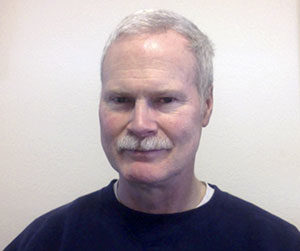In the 2016 movie Paterson, Adam Driver plays a bus driver named Paterson, who works in the town of Paterson, New Jersey. It’s the same town where the poet William Carlos Williams practiced medicine, and Williams has a not insignificant presence in the movie. The bus driver is also a poet; he listens to the conversations on his bus and writes poems based on what he hears.
Art, meet life. Or perhaps this is a case of art imitating life.
Flip to the other side of the United States, specifically, Seattle, Washington. For 30 years, Michael Spence was a bus driver for the transit authority, after serving in the military. Spence also was, and is, a poet. During his years driving a bus, Spence published four poetry collections. His most recent, Umbilical, published in 2016, won the New Criterion Poetry Prize.
His work has been published in The Chariton Review, The Gettysburg Review, The New York Quarterly, the North American Review, Notre Dame Review, The Sewanee Review, The Yale Review, The Hudson Review, and many other literary journals as well as anthologies.
What’s more, Spence writes classical poetry in an age that, at best, frowns on classical poetry. Umbilical includes classical poems about such subjects as World War II, the Viet Nam War, modern sculpture, poetry, names (including his own), history, and the end of the world. He writes about living in New Orleans as a teenager; we were teens in New Orleans at the same time, except he lived in New Orleans East and I lived in a western suburb.
Spence also writes about childhood, and growing up, and family. The title poem gives a reflective sense of what Spence’s poetry and this particular collection are about.
Umbilical

To mine, hobbling me so you could nap
And not worry I would wander loose
Those summer afternoons. But who could sleep
In such light? No boy of eight. I’d wait
Until your breath grew even. Holding mine,
I’d sit up slowly, carefully work the knot—
A ball of snake coils small but intricate
As trip-wires. One day I slipped the noose,
Eased off the creaking bed. I felt my face
Tighten around the eyes. Afraid you’d call
Me back, I tiptoed toward the doorway; no sign
I’d wakened you. I listened, then took a step
Through—and saw the darkness of the long hall.

Michael Spence
I’m reminded of how my own mother, when I was a young child (younger than Spence’s eight), craftily convinced me to take naps. “You don’t have to sleep,” she would say. “All you have to do is rest your eyes. We’ll both just lie here and rest our eyes.” Without fail, I would fall asleep, until the day I told her that if I rested my eyes, I would fall asleep. And that was the end of her subterfuge.
Spence is the author of four previous poetry collections: The Spine (1987), Adam Chooses (1998), Crush Depth (2009), and The Bus Driver’s Threnody (2014). He lives in Washington State.
Umbilical is an extraordinary collection of poetry, filled with reflection, understanding, generosity, and not a little love. It’s not about the experience of driving a bus. But it will make me look at bus drivers in an entirely different light.
Photo by Mark Chinnick, Creative Commons, via Flickr. Post by Glynn Young.
__________________________

“I require all our incoming poetry students—in the MFA I direct—to buy and read this book.”
- Poets and Poems: Sandra Marchetti and “Diorama” - April 24, 2025
- Poets and Poems: Christina Cook and “Roaming the Labyrinth” - April 22, 2025
- Longfellow’s “Paul Revere’s Ride”: Creating a National Legend - April 17, 2025

Leave a Reply